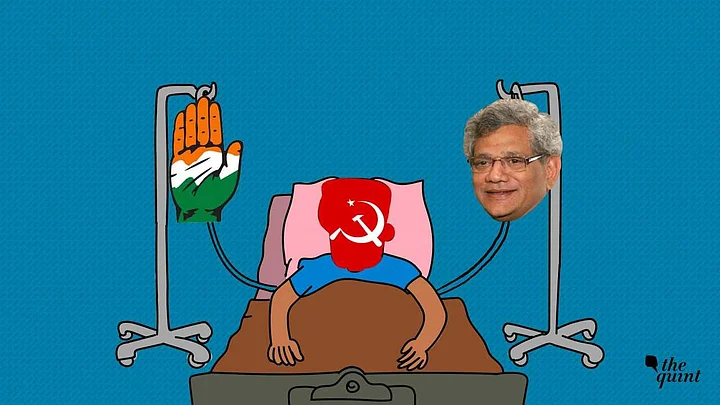In the end, it all boiled down to how a crucial line was phrased. On day three of the 22nd Congress of the Communist Party of India (Marxist) in Hyderabad, the party removed the words “without having an understanding with the Congress party” and retained, “without having a political alliance with the Congress party” in its final resolution.
This, in effect, gives a lifeline to Sitaram Yechury, because in the central committee meeting held in Kolkata in January, the general secretary’s line pushing for being on the same side as the Congress was defeated by 31 votes to 55.
The change in the resolution is a setback to the Prakash Karat lobby as its draft had been adopted four months ago. The change is significant because it is the first time in the history-obsessed CPI(M), since it was formed in 1964, that a draft political resolution approved by the powerful central committee has been amended.
Winners and Losers
What does it mean for the beleaguered Left, in power only in Kerala now? It means the decks have been cleared for a possible electoral understanding with the Congress, without using the nomenclature of an alliance. It means that barring Kerala, where the Left and the Congress are rivals, the two could do business with each other in the other 28 states of the country.
This also means Yechury’s second term as general secretary is almost a done deal. It would have been untenable had his line been rejected outright by the party Congress.
Nevertheless, the names of Brinda Karat, BV Raghavulu and Manik Sarkar are doing the rounds as potential general secretaries.
The new resolution is also a setback for the Kerala camp as the Pinarayi Vijayan group has had the upper hand within the CPI(M) ever since the party lost power in Bengal. Vijayan knows that this would expose his party to barbs from the BJP that in the past has taunted it saying, `Bengal me dosti, Kerala me kushti'. The CPI(M) also fears this would lead to ceding the opposition space to the BJP, which is only waiting for such an opportunity.
New Resolution: Kolkata to Hyderabad
In Kolkata, the Karat camp drew ammunition from the fact that the 2016 West Bengal assembly elections, where the CPI(M) had an electoral understanding with the Congress, saw the latter win more seats than the Left. It was seen as a vindication for Karat because he had opposed the idea of an alliance before 2016 as well.
But in terms of perception, the Kolkata decision sent the wrong signals. The Left's refusal to be seen on the same side as the Congress meant a hit for the Index of Opposition unity. In fact, jokes started circulating with some newspapers in Kolkata calling it a BJP victory in the CPI(M). Many spoke of the decision as yet another historic blunder, the first being to refuse Jyoti Basu the chance to become PM in 1996.
How did Yechury, then, turn the tables given the brute majority the Karat camp had in the powerful central committee?
For one, with over 700 delegates who had a say in the resolutions, Yechury had a better chance of getting his way in Hyderabad. Two, the humiliating defeat in Tripura, where the BJP stormed the CPI(M) citadel, was a rude wake-up call. It reduced the CPI(M) to Communist Party of India (Malayalee).
Given the Kerala electorate's tendency to play musical chairs every five years, everyone knew the next assembly elections in the southern state in 2021 could see the Left vanishing from the power map of India. Many of the delegates saw the writing on the wall.
Which is why the resolution now also says : “Appropriate electoral tactics to maximise the pooling of anti-BJP votes should be adopted based on the above political line of the party”.
A Divided House
The whispers of a secret ballot seemed to have done the trick. Delegates from as many as 15 states are believed to have asked for secret ballot on the political resolution. That was a googly as the party has never adopted a secret ballot approach to deciding crucial political strategy. What it brought out in the open was a deep division within the ranks and two, the fear factor among the delegates, who perhaps did not want to be openly identified as one on Yechury's side.
Nevertheless, in sharp contrast to other mainstream parties - both national and regional - where a few individuals or families decide the line, the CPI(M) has shown what true inner party democracy is all about.
But does it mean all is hunky dory within the Marxist camp. Far from it.
The Karat camp is not likely to take kindly to the `Karat proposes, party disposes’ situation. On the other side, Yechury bristled during the deliberations, shrugging off the tag of having a “pro-Congress’’ mindset”, emphasising that he is not a Congressman.
His position has been that ploughing a lonely furrow was hardly likely to help the opposition's cause to defeat the BJP.
India will know in 2019 if this unusual U-turn taken by the CPI(M) will help the Reds flash the `V' sign.
(The writer is a senior journalist. He can be reached @Iamtssudhir. This is an opinion piece and the views expressed above are the author’s own. The Quint neither endorses nor is responsible for the same.)
(At The Quint, we question everything. Play an active role in shaping our journalism by becoming a member today.)
